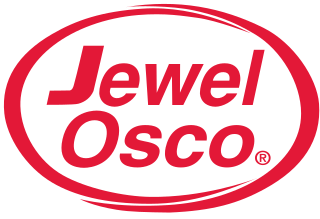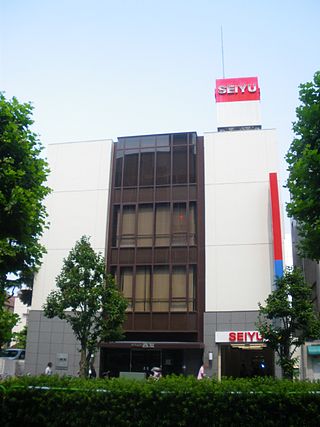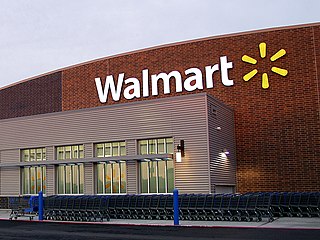
Jewel-Osco is a regional supermarket chain in the Chicago metropolitan area, headquartered in Itasca, a western suburb. In 2007, the company had 188 stores across northern, central, and western Illinois; eastern Iowa; and portions of northwest Indiana. Jewel-Osco has been a wholly owned subsidiary of Boise-based Albertsons since 1999. The company originally started as a door-to-door coffee delivery service before it expanded into delivering non-perishable groceries and later into grocery stores, and supermarkets. Prior to its 1984 acquisition by American Stores, Jewel evolved into a large multi-state holding company that operated several supermarket chains and other non-food retail chain stores located from coast to coast and had operated under several different brand names.
Shoppers Drug Mart Inc. is a Canadian retail pharmacy chain based in Toronto, Ontario. It has more than 1,300 stores in ten provinces and two territories.

Seiyu KK, or Seiyu Group, is a Japanese group of supermarkets, shopping centers and department stores, headquartered in Akabane (赤羽), Kita, Tokyo. On May 8, 2023, the Akabane headquarters office was relocated due to the redevelopment of Seiyu's Akabane store site. The current head office location is Kichijoji Honmachi, Musashino City, Tokyo.
Walden Book Company, Inc., doing business as Waldenbooks, was an American shopping mall-based bookstore chain and a subsidiary of Borders Group. The chain also ran a video game and software chain under the name Waldensoftware, as well as a children's educational toy chain under Walden Kids. In 2011, the chain was liquidated in bankruptcy.
CSK Auto, Inc. was a specialty retailer of automotive parts and accessories in the western United States. CSK Auto became a publicly traded company in March 1998, headquartered in Phoenix, Arizona, and grew through a combination of acquisitions and organic growth. It was acquired in 2008 by O'Reilly Automotive.

Lucky Stores are a pair of American supermarket chains plus a defunct historical chain. The original chain was founded in San Leandro, California and operated from 1935 until 1999. The Lucky brand was revived circa 2007 and is now operated as two distinct chains: Albertsons operates Lucky in Utah and Save Mart Supermarkets operates Lucky California in Northern California.

White Front was a chain of discount department stores in California and the western United States from 1959 through the mid-1970s. The stores were noted for the architecture of their store fronts which was an enormous, sweeping archway with the store name spelled in individual letters fanned across the top. For several years, White Front was the leading discount store in the U.S.
Turn Style was a chain of discount department stores and was a division of Chicago-based Jewel, the parent company of the Jewel Food Stores supermarket chain. Some mid-western Turn Styles had an Osco Pharmacy, at the time very uncommon for a discount store in the 1960s and 1970s. At its peak, the chain comprised more than fifty stores throughout Chicago, as well as in downstate Illinois, Decatur, Illinois, Moline, Illinois; Davenport, Iowa; Omaha, Nebraska; Boston, Massachusetts; Merrillville, Indiana; Michigan, and Racine, Wisconsin.
Interstate Department Stores, Inc., was an American holding company for a chain of small department stores, founded in Delaware in 1928. After a very rapid expansion as the result of acquisition and expansion of two discount store chains acquired in 1959 and 1960 and also two toy store chains acquired in 1967 and 1969, the firm was renamed in 1970 as Interstate Stores, Inc., to better reflect its business. Increased competition and the changes in consumer buying habits eventually led to decreased sales in the late 1960s and early 1970s which forced the firm to file for bankruptcy in 1974. After shedding all of its non-performing units, the firm was able to exit bankruptcy with the entire toy division intact along with a small remnant of the department store division in 1978. The firm was renamed Toys "R" Us upon emergence from bankruptcy.

FedMart was a chain of discount department stores started by Sol Price, who later founded Price Club. Originally a discount department store open to government employees paying a $2 per family membership fee, FedMart earned four times more than its investors had projected in its first year. Over the next 20 years, FedMart grew to include 45 stores, mostly in California, and the Southwest in a chain that generated over $300 million in annual sales. The business expanded to several states in the Southwest United States. Many stores were previous White Front or Two Guys locations. Price later sold two-thirds of the chain to Hugo Mann, a German retail chain, in 1975 and was forced out of his leadership position the following year. FedMart went out of business in 1982.

Federal Employees' Distributing Company, known as Fedco, was a membership department store chain that operated in Southern California from 1948 to 1999.

The history of Walmart, an American discount department store chain, began in 1950 when businessman Sam Walton purchased a store from Luther E. Harrison in Oklahoma City, Oklahoma, and opened Walton's 5 & 10. The Walmart chain proper was founded in 1962 with a single store in Rogers, Arkansas, expanding inside Oklahoma by 1968 and throughout the rest of the Southern United States by the 1980s, ultimately operating a store in every state of the United States, plus its first stores in Canada, by 1995. The expansion was largely fueled by new store construction, although the chains Mohr-Value and Kuhn's Big K were also acquired.

Super-Pharm is an Israeli multinational pharmacy chain. It also operates in Poland, and previously operated in China. Super-Pharm was founded by Murray Koffler with his two oldest children, Leon and Theo. The pharmacy uses a similar logo, and has private-label brands, as Shoppers Drug Mart in Canada, which was also founded by Koffler.
The Lane Drug Company of Ohio, was a discount drugstore chain in the United States that was originally based in Toledo, Ohio. On 10 April 1989, the chain was acquired by Rite Aid Corporation of Harrisburg, Pennsylvania, and operated as a division of Rite Aid until late 2024, when Rite Aid closed all Ohio locations after filing for Chapter 11 bankruptcy protection in October, 2023.
Interstate Department Stores, Inc., was an American holding company for a chain of small department stores, founded in Delaware in 1928. After a very rapid expansion as the result of acquisition and expansion of two discount store chains acquired in 1959 and 1960 and also two toy store chains acquired in 1967 and 1969, the firm was renamed in 1970 as Interstate Stores, Inc., to better reflect its business. Increased competition and the changes in consumer buying habits eventually led to decreased sales in the late 1960s and early 1970s which forced the firm to file for bankruptcy in 1974. After shedding all of its non-performing units, the firm was able to exit bankruptcy with the entire toy division intact along with a small remnant of the department store division in 1978. The firm was renamed Toys "R" Us upon emergence from bankruptcy.

Eisner Food Stores was a chain of supermarkets in Illinois and Indiana. It was acquired by The Jewel Companies, Inc. in 1957. The Eisner stores were rebranded as Jewel in 1985.
Akron Stores or The Akron was a Southern California–based imported goods and home decorating department store retail chain established in 1947 and was known to carry unusual merchandise, mostly imports. The chain had over 24 stores throughout Southern California from San Diego to San Francisco before it was forced to close in 1985.









